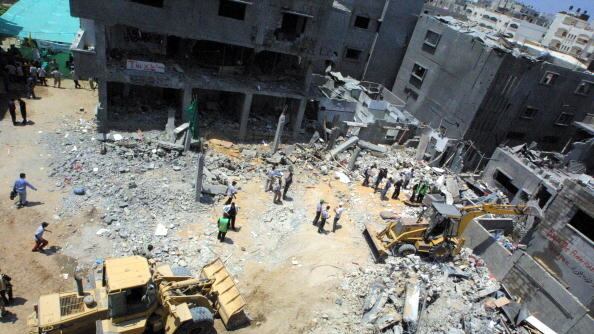In international affairs as in life, it’s often the little things. As little as a pebble perhaps, or, more specifically: gravel.Supporters of Israel’s right-wing government like to insist that the Gaza Strip is no longer occupied, the argument being that once the IDF left Gaza’s interior, the occupation ceased—but consider if you will the following information, released yesterday by Israeli human rights organization Gisha:
For the first time since the [blockade] was imposed on the Gaza Strip in [September] 2007, Israel has allowed the entry of gravel for the private sector.

Which is to say: For more than five years, a foreign power has determined that Gaza’s commercial interests may not have access to little rocks.It’s true that some 1000 trucks’ worth of gravel have been allowed into the Strip in recent months, but it was all bound for international organizations (who had to undergo a lengthy application process to obtain the gravel), and absolutely not for local businesses.
I’ve never had to rebuild a war-shattered economy or infrastructure, but I think it’s a safe bet that without gravel, such rebuilding might be a fair bit tougher. Yet for five years, Israel has kept that resource from any Gazans who have needed it, along with a long and varying list of other items, the fate of each item resting, of course, with Israel’s military bureaucrats. At various times the list has included concrete, paper, musical instruments, and nutmeg. Indeed, as Gisha recently forced the government to admit, at a certain point Israel calculated just how many calories Gazans need in order not to starve.
Israel’s official reason for disallowing gravel and other construction materials is that they’re “dual use,” meaning that they can also be used for military purposes. I’m not sure how nutmeg fits into this calculus, but leaving spices aside for the moment, there’s a special kind of knowing obfuscation that insists that the State of Israel may reasonably prevent Gazans from obtaining, well, anything—and may furthermore make decisions about how much food Gazans need—but Israel is not an occupying power.
And of course it’s entirely possible that gravel and concrete can be, and in fact are, used to produce weapons. I’m pretty sure that Israel’s busy producing weapons even as I type—the difference is that no one’s in a position to stop them.
But here’s another thing that’s likely to produce weapons: Treating human beings this badly.
I don’t know if Israel’s noticed, but human beings who are told how much food they may eat and where and whether or not they may build have traditionally chosen to fight back.






